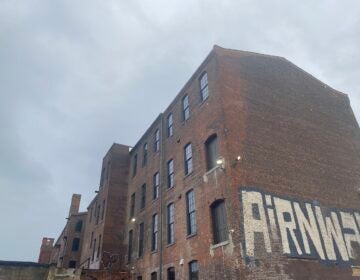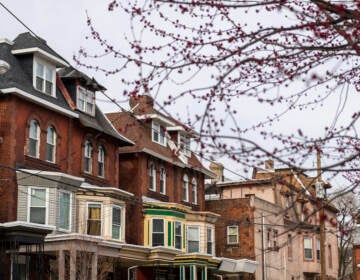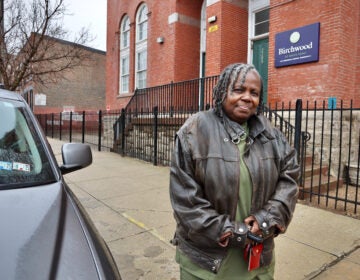A Philly woman is building ‘not tiny’ houses for formerly homeless people — and their pets
Nonprofit developer Stephanie Sena will test her model for low-cost, infill housing on vacant land acquired from the Philadelphia Land Bank in 2018.
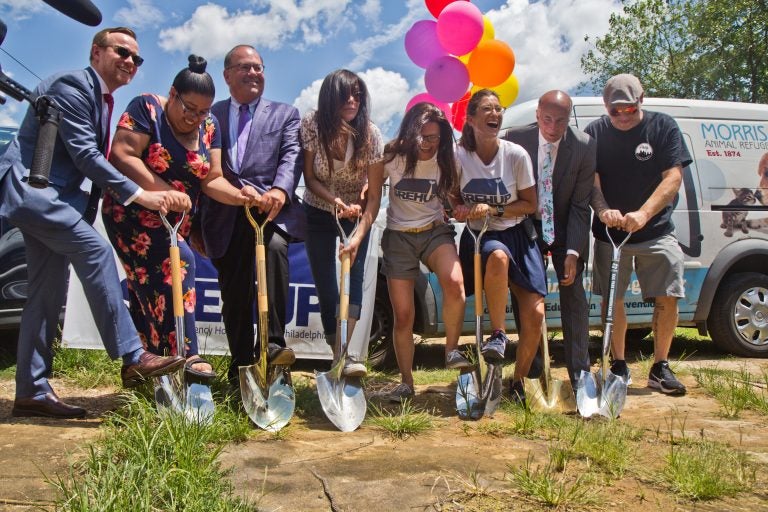
Ground was broken Wednesday on a model unit on a 700 square-foot, city-owned parcel of land at 2147 Orleans Street in Greater Kensington. (Kimberly Paynter/WHYY)
This article originally appeared on PlanPhilly.
—
Can small houses result in big change?
That’s the question Stephanie Sena wants to answer with a Port Richmond development of prefabricated homes that broke ground Wednesday on a vacant city-owned lot.
“This is the first low-barrier emergency housing in Philadelphia, which welcomes people with the three Ps — their partners, their property, and their pets,” said Sena, the founder of the Student-Run Emergency Housing Unit of Philadelphia, a nonprofit that works with university students to provide shelter for homeless people.
The “cozy cottages,” as Sena calls them, will be 900-square-foot, prefabricated dwellings designed to be low-cost. She plans to sell each for less than $100,000. The new name marks a departure from earlier plans that marketed the Orleans Street project as tiny homes.
“We were calling them ‘tiny homes,’ we are now calling them ‘cozy cottages,” Sena said. “The term tiny home is very misunderstood. Some people were envisioning a shed, or a unit on wheels. These units will be small. But on foundation, and with electricity and plumbing.”
Tiny house or not, the diminutive dwellings have attracted the notice, and material support, of supporters on City Council who would like to see the model brought to scale citywide to help address Philadelphia’s affordable housing crisis.
Sena acquired the vacant lot on Orleans Street where she will test her model for affordably-built infill homes from the Philadelphia Land Bank in 2018. She got the public land for free with the support of City Councilmember Mark Squilla, whose district includes the lots.
“This is the most amazing housing cost we’ve seen in this city in many years,” City Councilmember-at-large Allan Domb said Wednesday at the groundbreaking. “For $80,000 or $90,000 we can deliver a brand new home. The way I see it, we now build affordable homes that cost $418,000. We can build five of these for that price. We need to look at this across the board.”
Domb personally gave SREHUP a no-interest, $75,000 loan to get started. The councilmember’s money will go to build the second home on Orleans Street while the costs of the first home will be covered by $75,000 from the nonprofit group Rescue Rebuild, Sena said.
Her organization plans to sell the houses to formerly homeless individuals at close to cost, because the group does not need to turn a profit. The nonprofit isn’t receiving public funding either, so it won’t be bound by some of the regulations that can drive up costs.
Sena hopes to have the two new homes done by the end of the year. Installment of the prefab structures happens quickly. The bulk of the construction time will be spent clearing rubble, preparing the foundation, and setting up utilities.
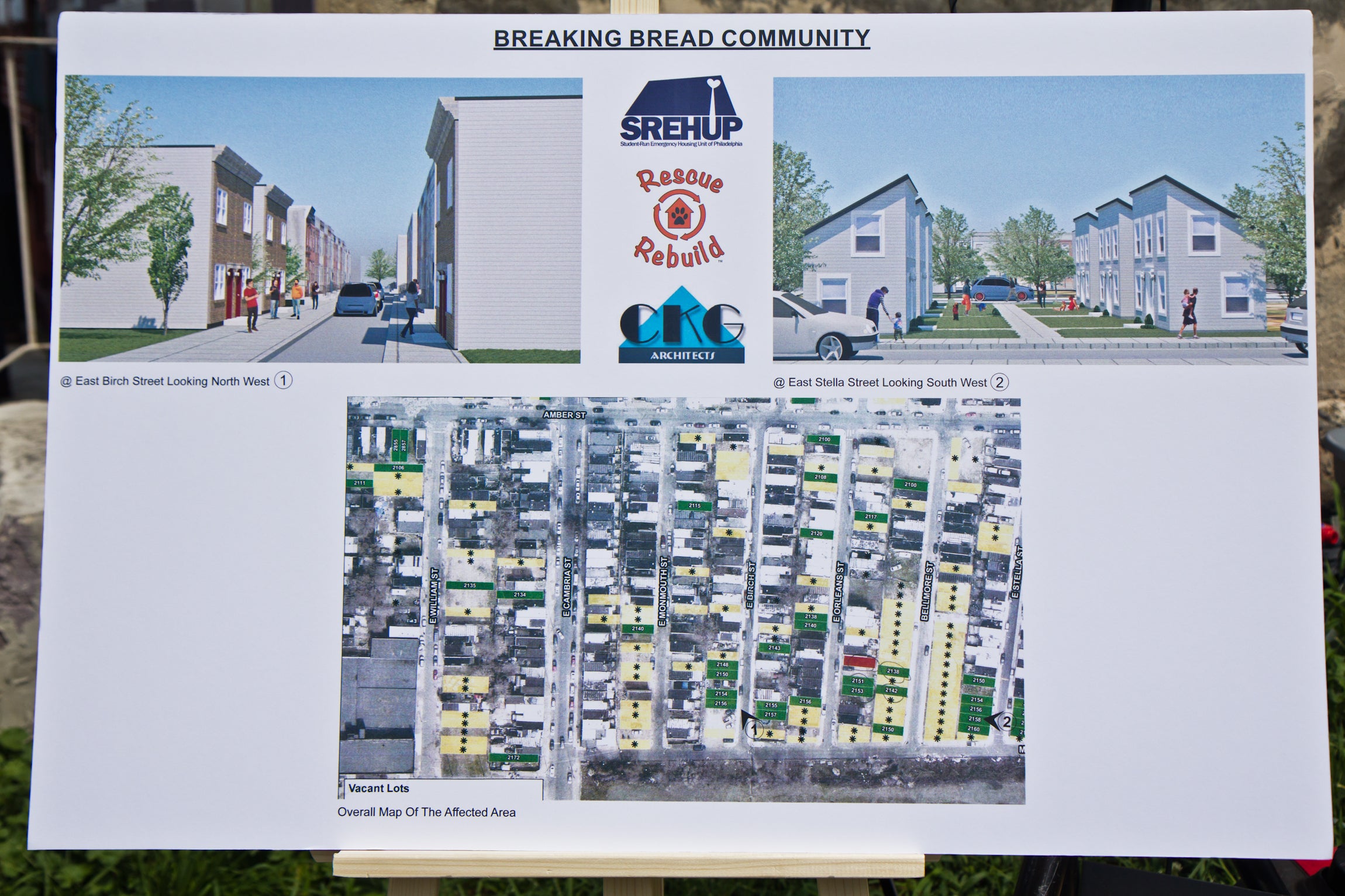
A model for low-cost housing
Even if Sena succeeds, spreading the affordable homes to neighborhoods across the city will be a much longer journey.
Construction costs are unusually high in Philadelphia. Critics of the city’s practices point to a convoluted development process and the higher cost of labor especially for many subsidized projects, which are usually required to pay prevailing wage and work with the building trades unions.
Other people have tried to introduce models for small, low-cost housing. In the late 2000s, ISA Architects designed the $100K House Project on lots close to Port Richmond. Developers built the homes, but the model was never brought to scale.
Brian Phillips of ISA said the $100K House was never meant to be mass produced. The homes were built without subsidy, or the foundation and corporate assistance, that Sena plans to rely on.
“The bureaucracy and regulations that come with subsidies do have costs,” Phillips said. “Some of those costs are admirable — like providing local people with jobs — but there is a different balance between the additional cost of construction and the subsidies.”
No matter the math, building a new house that can be sold for less than $100,000 is tricky, he said.
Sena is counting on City Hall connections to continue helping her.
“That is one way of many that we are keeping our costs down, because we have a lot of skills, time and resources donated to us including from the trades, through a deal that [the city’s Deputy Director for Labor] Rich Lazer worked out,” said Sena.
The Kenney administration confirmed that the Mayor’s Office of Labor met with Sena to discuss SREHUP’s needs and that the trades have expressed an interest in helping. But there is not a specific agreement in place at this time, a city spokesperson said.
Which isn’t to say there won’t be one in the future.
The original American public housing policy was created in part as a jobs program for unemployed building trades members during the Great Depression. Union jobs and subsidized housing have been closely linked ever since.
Squilla, who has been talking with Sena about her plans for years, said he thinks a larger deal could be reached eventually.
“I think we will know more after we do one or two of these, but I really believe with this type of model we can build more housing that’s affordable,” Squilla said. “This is new for everybody, [the building trades] want to learn about it too, to see if they can benefit too. Maybe it’s an opportunity to have apprentices come in and learn how to build these type of projects and that’s something they can put in their repertoire.”
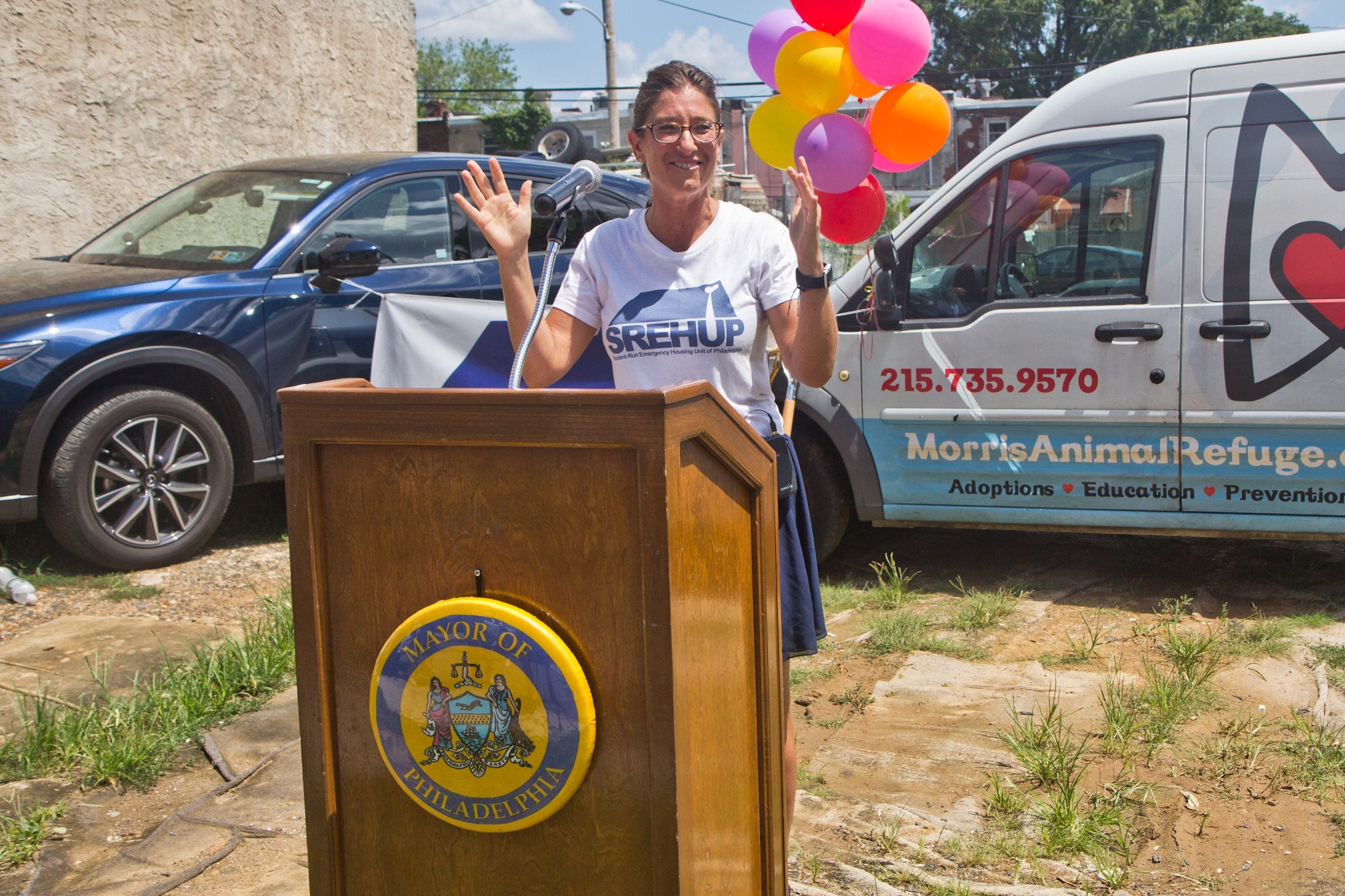
As for Sena, she is more focused on her immediate project. She gleefully took the microphone at the groundbreaking on Wednesday and shouted out to her supporters in the animal welfare and homeless services professions.
She traded appreciations with her friend Lucy Noland, formerly a Fox 29 anchor, who helped her organize the project.
The two have a blitz of activity still to come even after the two houses go up on the Orleans lot. Sena hopes to secure funding for a community center on the site. She also hopes to make an announcement soon about funding for a “cozy cottage” village on a larger parcel of land, which would host smaller detached homes.
A crowd of supporters cheered her on at Wednesday’s event, including neighbors from the surrounding rowhomes who Sena has been regularly meeting with to ensure their support. Organizations like Morris Animal Refuge, the city’s animal shelter ACCT Philly, and Rescue Rebuild all sent representatives. Epic Church presented a $8,000 check at the groundbreaking.
Sena also said she plans to work with neighborhood residents and a group called Philly Unknown to install “guerilla gardens” at some of the unclaimed vacant land on the block and on others around the Port Richmond and Kensington area.
“This project is an adventure, it’s good for our neighbors both human and animal,” Sena said. “This is the best of this city.”
WHYY is your source for fact-based, in-depth journalism and information. As a nonprofit organization, we rely on financial support from readers like you. Please give today.




